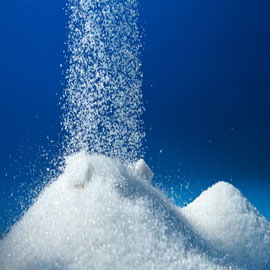Sugar: America’s Public Enemy No. 1
 As increased attention is being paid to reducing the spread of obesity in our society, more experts and policymakers have been shining the spotlight directly on sugar, one of the major culprits of American weight gain. Disney has announced that it will no longer market junk food to kids on TV or radio by 2015. New York Mayor Michael Bloomberg has planned a ban on sugary drinks over the size of 16 ounces in his city’s sports venues, restaurants and movie theaters. Many of companies who market foods and beverages to children are being pressured to change their tactics as schools begin offering more fruits and vegetables in lunches.
As increased attention is being paid to reducing the spread of obesity in our society, more experts and policymakers have been shining the spotlight directly on sugar, one of the major culprits of American weight gain. Disney has announced that it will no longer market junk food to kids on TV or radio by 2015. New York Mayor Michael Bloomberg has planned a ban on sugary drinks over the size of 16 ounces in his city’s sports venues, restaurants and movie theaters. Many of companies who market foods and beverages to children are being pressured to change their tactics as schools begin offering more fruits and vegetables in lunches.
Though bariatric surgery patients already know just how devastating sugar can be, the whole country is becoming more aware of our poisonously-high rates of sugar consumption. You may have quit sugar for good to focus on becoming healthier, but that doesn’t mean your friends, family, coworkers and countrymen have. Here are a few troubling facts that make reducing sugar consumption in the American diet so important in fighting the obesity epidemic and creating a healthier society.
- According to a statement from the American Heart Association, high sugar intake is linked to increased risk of high blood pressure, type 2 diabetes, obesity and other factors that increase the risk of heart disease and stroke. The few available studies that attempt to discredit the link between sugary beverage consumption and health consequences have been primarily funded by the beverage industry.
- The average American adult consumes about 22 teaspoons of sugar every day, which amounts to about 355 calories that are completely devoid of nutritional value. Though this comes from the usual suspects like table syrup and honey, the prevalence of food and drink processed with high fructose corn syrup has also been a major contributor.
- According to the USDA’s Economic Research service, average daily calorie intake has increased by about 425 since 1970, with between 16 and 17 percent of calories coming from added sugar. Though sugar consumption has gone down 40 percent since the 70’s, increased consumption of high fructose corn syrup has more than made up for the reduction.
- Weight gain caused by sugar consumption can lead to increased accumulation of fat in the liver, which lowers your body’s ability to control blood sugar and forces your liver and pancreas to work harder. High amounts of fructose in the liver (which come from sugar and high fructose corn syrup) can cause complex biochemical reactions that lead to serious health concerns.
Though companies and advocacy groups with a vested interest in reducing the demonization of sugar make attempts to convince Americans of its minimal impact, the research is straightforward. Recent studies showed a direct link between excessive intake of sugary food items and high blood pressure, while further study revealed that a reduction of that consumption resulted in a reduction of blood pressure. New studies are released that consistently reinforce the idea that the levels at which we consume sugar make the stuff toxic.
Consider this: one 16-ounce regular soda, the maximum volume allowed by Mayor Bloomberg’s large drink ban, contains a minimum of 12 teaspoons of sugar. The American Heart Association recommends no more than 6 teaspoons of sugar per day for women and 9 teaspoons for men. This means that a small soft drink at McDonald’s, which is 16 ounces, contains twice the daily recommended amount of sugar for an adult woman.
Despite these recommended values, cutting out sugar for good may be the best bet for many Americans. If you’re a patient of bariatric surgery or have struggled with weight problems, share this information with those you care about, even if they don’t face the same weight concerns you do. Though many people may not think that the amount of sugar they consume is a problem, raising awareness about how detrimental sugar can be for every individual’s health will help us solve the spreading problem of obesity that has made Americans heavier than ever before.
